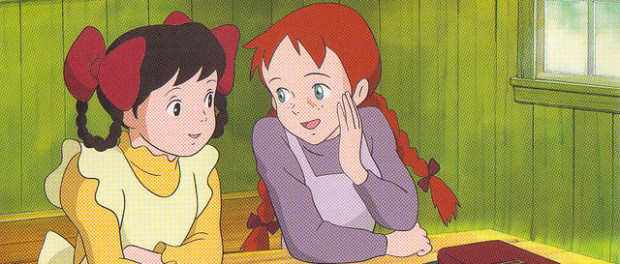Kickstarter: Why do the Japanese Love Anne of Green Gables?
While Hayao Miyazaki’s Totoro and Ponyo have a hold on North American audiences, Prince Edward Island’s most famous export, Anne of Green Gables has a claim on the hearts of the Japanese. Nowhere is this more evident than on Prince Edward Island. This year, the province expects between 10,00 and 20,000 Japanese tourists to come in search of Anne on the heels of an NHK 156-part drama about Hanako Muraoka, the woman who translated the book following World War II. Furthermore, a new blue ray edition of the 50-episode 1979 anime Akage No An (Anne of Red Hair) is scheduled to be released.
The Japanese fascination with Anne is a subject of a new documentary being created by Terry Dawes, a former Islander and current Montrealer. Dawes is raising money for his project through Kickstarter. Though he’s a newbie to the crowdfunding (“I feel like I’ve joined Glengarry Glenross.”), he’s had this project in mind for a long time and has been doing his research.
http://vimeo.com/61977776
He explains the history of the pilgrimages to PEI. “The Buttercups were an Anne of Green Gables fan club and the first Japanese tourists who made an Anne inspired in 1983,” Dawes says. He explains that there is a term in Japanese for “young office ladies,” women who save up for seven or eight years in order to be able to do something special. Many use their savings to take a trip to PEI.
Dawes joined in on one of the Japanese bus tours to see what happens. He recounts some of the stopping points — Cavendish and New London. “They visit the house replica near Cavendish,” says Dawes. “They think it’s Green Gables. No one wants to risk saying that it’s not based on real people.”
http://youtu.be/qZoMZ1y-xYA
The fascination with Anne has a lot to do with the Japanese value system. For the post-World War II generation, Anne served as a feminist role model. “The popularity of Anne says a lot about women in Japanese society, even today. There’s not a lot of radicalism in the culture,” Dawes says. “Anne is a model of acting up and speaking her mind without overthrowing the establishment. For many generations of Japanese woman, Anne has been a model of how to express oneself and advance socially without offending social values. The Japanese value the family first and self-sacrifice and not being selfish. Anne Shirley provides the archetype of how to behave.”
Dawes also believes the book’s popularity has to do with being published at the right time. “I found out from a man who was alive in WW II, that there were no books around after the war when Anne of Green Gables got published. Anne’s story is about overcoming difficulties like being an orphan and a social outcast through her sheer perseverance and her personality. She rises above and makes do with what she has,” Dawes explains. “The story resonated with Japanese public and they had nothing else to read.”
Dawes is using the film to advance his hypothesis that Anne is no longer a possession of PEI. “I have this theory that Anne has become an orphan again and has been adopted by the Japanese,” Dawes says. “She’s not ours anymore. The Japanese version of Anne is not our version of Anne. She’s a Japanese cultural phenomenon, while the people of PEI are a little tired of discussing Anne.”
Although Dawes has a background in arts and film (a BA from Emily Carr in Vancouver and an MFA in film from Concordia), he has to persevere to get funding for projects since he started working. “I’m not a trust fund kid and can’t just hang out. After art school, I had to get a regular job,” he says. He’s managed to get some Canada Council funding to show some films abroad, but the Anne film hasn’t gotten any backing so far. “It’s been a bit of a hard sell to the Canada council,” he explains. “I pitched it to producers and broadcasters, and everyone thinks it sounds great, but they are afraid to show people speaking Japanese. Subtitles are the kiss of death.” In this way, Kickstarter allows Dawes to “have absolute creative control.” He can let his subjects speak in their own voices, without voice-over-narration.
Dawes sees parallels between his own life and that of his film as well. “I left PEI in 1998 and I was a typical angsty teenager with a typically alienated experience. I couldn’t wait to leave PEI,” he explains. “As I travelled around, I realized that PEI is the most beautiful place on the planet and I miss it in a serious way. It gets its hooks into you. It’s part of my identity and I have a complicated relationship with out with the film. Part of this movie is about issues of identity and the capacity for identifying with someone else’s culture that isn’t yours. I totally get that intuitively, in a very visceral way, how Japanese women feel about Anne of Green Gables.”
You can help Terry Dawes reach his kickstarter goal of $21,000 HERE. The campaign ends on March 17, 2014.







